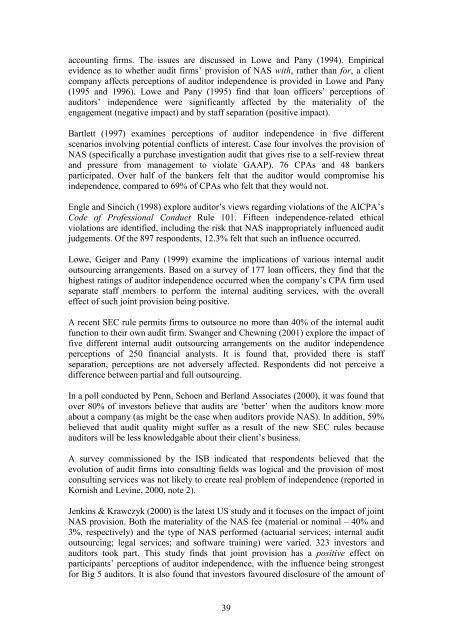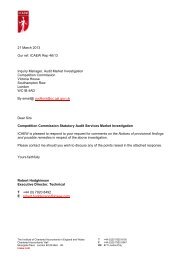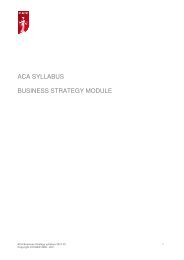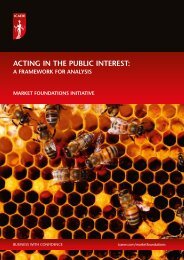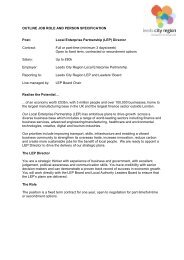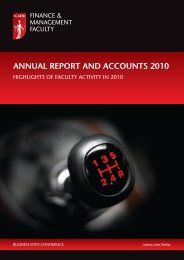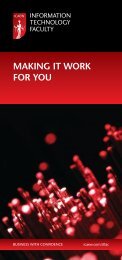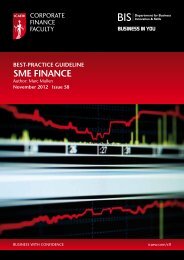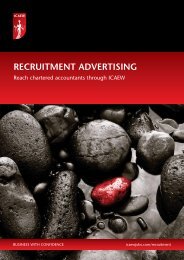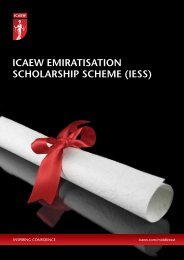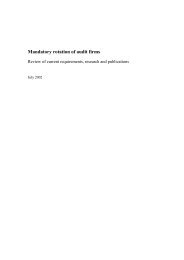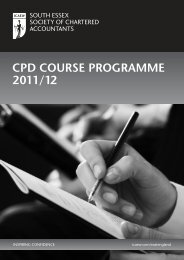Auditor independence and non-audit services - ICAEW
Auditor independence and non-audit services - ICAEW
Auditor independence and non-audit services - ICAEW
You also want an ePaper? Increase the reach of your titles
YUMPU automatically turns print PDFs into web optimized ePapers that Google loves.
accounting firms. The issues are discussed in Lowe <strong>and</strong> Pany (1994). Empiricalevidence as to whether <strong>audit</strong> firms’ provision of NAS with, rather than for, a clientcompany affects perceptions of <strong>audit</strong>or <strong>independence</strong> is provided in Lowe <strong>and</strong> Pany(1995 <strong>and</strong> 1996). Lowe <strong>and</strong> Pany (1995) find that loan officers’ perceptions of<strong>audit</strong>ors’ <strong>independence</strong> were significantly affected by the materiality of theengagement (negative impact) <strong>and</strong> by staff separation (positive impact).Bartlett (1997) examines perceptions of <strong>audit</strong>or <strong>independence</strong> in five differentscenarios involving potential conflicts of interest. Case four involves the provision ofNAS (specifically a purchase investigation <strong>audit</strong> that gives rise to a self-review threat<strong>and</strong> pressure from management to violate GAAP). 76 CPAs <strong>and</strong> 48 bankersparticipated. Over half of the bankers felt that the <strong>audit</strong>or would compromise his<strong>independence</strong>, compared to 69% of CPAs who felt that they would not.Engle <strong>and</strong> Sincich (1998) explore <strong>audit</strong>or’s views regarding violations of the AICPA’sCode of Professional Conduct Rule 101. Fifteen <strong>independence</strong>-related ethicalviolations are identified, including the risk that NAS inappropriately influenced <strong>audit</strong>judgements. Of the 897 respondents, 12.3% felt that such an influence occurred.Lowe, Geiger <strong>and</strong> Pany (1999) examine the implications of various internal <strong>audit</strong>outsourcing arrangements. Based on a survey of 177 loan officers, they find that thehighest ratings of <strong>audit</strong>or <strong>independence</strong> occurred when the company’s CPA firm usedseparate staff members to perform the internal <strong>audit</strong>ing <strong>services</strong>, with the overalleffect of such joint provision being positive.A recent SEC rule permits firms to outsource no more than 40% of the internal <strong>audit</strong>function to their own <strong>audit</strong> firm. Swanger <strong>and</strong> Chewning (2001) explore the impact offive different internal <strong>audit</strong> outsourcing arrangements on the <strong>audit</strong>or <strong>independence</strong>perceptions of 250 financial analysts. It is found that, provided there is staffseparation, perceptions are not adversely affected. Respondents did not perceive adifference between partial <strong>and</strong> full outsourcing.In a poll conducted by Penn, Schoen <strong>and</strong> Berl<strong>and</strong> Associates (2000), it was found thatover 80% of investors believe that <strong>audit</strong>s are ‘better’ when the <strong>audit</strong>ors know moreabout a company (as might be the case when <strong>audit</strong>ors provide NAS). In addition, 59%believed that <strong>audit</strong> quality might suffer as a result of the new SEC rules because<strong>audit</strong>ors will be less knowledgable about their client’s business.A survey commissioned by the ISB indicated that respondents believed that theevolution of <strong>audit</strong> firms into consulting fields was logical <strong>and</strong> the provision of mostconsulting <strong>services</strong> was not likely to create real problem of <strong>independence</strong> (reported inKornish <strong>and</strong> Levine, 2000, note 2).Jenkins & Krawczyk (2000) is the latest US study <strong>and</strong> it focuses on the impact of jointNAS provision. Both the materiality of the NAS fee (material or nominal – 40% <strong>and</strong>3%, respectively) <strong>and</strong> the type of NAS performed (actuarial <strong>services</strong>; internal <strong>audit</strong>outsourcing; legal <strong>services</strong>; <strong>and</strong> software training) were varied. 323 investors <strong>and</strong><strong>audit</strong>ors took part. This study finds that joint provision has a positive effect onparticipants’ perceptions of <strong>audit</strong>or <strong>independence</strong>, with the influence being strongestfor Big 5 <strong>audit</strong>ors. It is also found that investors favoured disclosure of the amount of39


